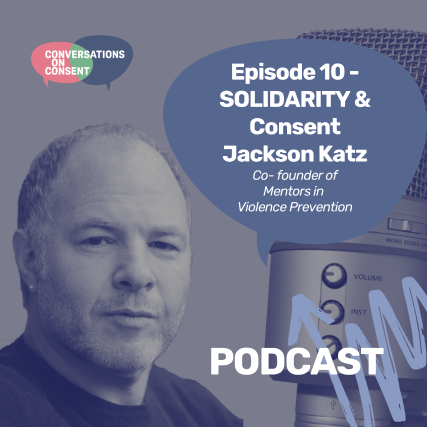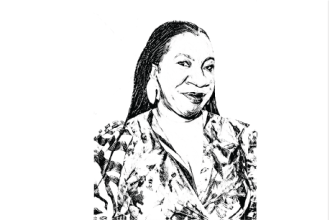SOLIDARITY
& CONSENT

Join the conversation on:
SOLIDARITY & CONSENT
<span data-metadata=""><span data-buffer="">Featuring Jackson Katz (Mentors in Violence Prevention)
Jackson Katz, the co-founder of Mentors in Violence Prevention, enters a conversation on solidarity and how it relates to fairness, leadership, gender justice.
Key Terms and Definitions
Here we clarified key terms and definitions to understand the topic better.
“A bystander is a person who is standing near and watching something that is happening but is not taking part in it.”
“An enabler is something or someone that makes it possible for a particular thing to happen or be done.”
“An engaged bystander is someone who intervenes before, during or after a situation when they see or hear behaviours that promote sexual violence.”
“Solidarity is the unity (as of a group or class) that produces or is based on a community of interests, objectives, and standards.”
Did you know… ?
Here are facts and figures on the topic.
One in four students reported being sexually harassed in Australian university settings in 2016, but only 20% of bystanders in these situations reported taking any action.
Soldiers who participated in bystander training were significantly more likely to report that they had helped an acquaintance or a stranger and that they had taken action when they saw sexual assault or stalking occurring, about to occur or after it had occurred.
In a survey conducted with Columbia students, 57.4 per cent of respondents did not intervene when witnessing another student behaving in a sexually violent or harassing manner and 78.9 per cent did not when witnessing another student heading for a drunken sexual encounter. In both cases, roughly 20 per cent cited that they did not intervene because they didn’t know-how.
33% of sexual assault begins to happen in the presence of a bystander who could take action to intervene.
Want to help spread the word? Share our animation on SOLIDARITY
Here are a few quick facts and some easy to understand information on this topic. Feel free to post to your social media accounts to get your friends involved.
Share now:
Solidarity Resources
Check out the following resources to learn more about nudity and consent.
#MeToo: The Role and Power of Bystanders (aka Us)
ACADEMIC ARTICLE
Take a look at the role of bystanders in preventing sexual harassment in the medical field.
How to be an active bystander
YOUTUBE VIDEO
The team behind Cambridge’s anti-harassment campaign Breaking the Silence, offers tips and techniques for distracting, disrupting or challenging a problem situation. Then asks – if we all became active bystanders, could we change our culture for good?
Bystander Intervention Tips and Strategies
TIP SHEET
Prevent Sexual Assault
RAINN TIP SHEET
Learn the different steps and strategies to use to prevent sexual assault
Next Gen Men
NON-PROFIT ORGANISATION
Next Gen Men focuses on educating boys and men to change how the world sees, acts and thinks about masculinity.
Defining solidarity to support an active citizenship
YOUTUBE
4Thought for Solidarity – is the research coordinated by European Solidarity Corps Resource Center. The aim of the publication was to contribute towards the common narrative on the concept of solidarity from the perspective of research, practice, policy and young people.
Myth Busters
Solidarity and consent are topics that are often misunderstood because of the myths surrounding them, here we want to clean up some of the most prominent misconceptions.
How to…
Check out these guidelines that help you to have conversations on consent.
… disrupt a situation you are witnessing.
Advice: Every scenario is unique. There is no one-size-fits-all solution. Either divert the harasser or focus on the targeted person to get them out of an abusive situation. You may also refer to a person of authority such as security personnel or the police.
... engage other bystanders.
Advice: You can gain support from those around you to intervene in a crisis. It can be intimidating to approach an abusive situation alone. Ask others to support you directly by describing what you have witnessed and asking for help engaging in the situation.
… confront the harasser.
Advice: You can tell the harasser that their words or behaviours are not acceptable and respectful in a direct and honest way. Make it a habit to speak up and intervene when you overhear people degrading others. Openly addressing unacceptable behaviour has a snowball effect, encouraging others to get engaged.
… take action online.
Advice: Everyone can play a role in combating hate speech online. When spotting any form of online abuse it is vital to reply to victim-blaming, rape jokes, and other inappropriate social media comments.
Solidarity and Consent Cases
Here we highlight prominent cases.
Tarana Burke
CASE:
Tarana Burke began using the phrase “Me Too” in 2006 to raise awareness of women who had been abused. She had created Just Be Inc., a nonprofit organization that helps victims of sexual harassment and assault as she found there were little to no resources to support victims prior to that. Alyssa Milano, an American actress, used the hashtag #metoo on a tweet that turned viral. After that tweet, she reached out to Tarana Burke for cooperation and to credit her for creating the campaign.
ANALYSIS:
Tarana Burke created a campaign as she felt powerless when hearing from sexual harassment victims. The tweet that sparked it all – and the former recognition of who created the campaign – are two examples of how solidarity can be the beginning of a positive change.

Charles Sonder
CASE:
As a fight erupts between a man and a woman on the NYC metro, Charles Sonder stepped toward them and stopped, directly between them. He didn’t say a word, just kept eating his chips. With Mr Sonder forming an implacable barrier, the fight calmed down and stopped.
ANALYSIS:
Charles Sonder successfully diffused the situation by creating a diversion and changing the dynamic of the situation.

Know Your Rights
Solidarity is of utmost importance and it is important to understand the rights and obligations you have in this domain.
Interpretations of Consent and Solidarity
Countries have varying approaches to motivate and protect bystanders to become upstanders in times of need. These can be separated into “Good Samaritan” Laws, Duty to Rescue and Duty to Report.
Good Samaritan Law prevents a rescuer who has voluntarily helped a victim in distress from being successfully sued for wrongdoing. Its purpose is to keep people from being reluctant to help a stranger in need for fear of legal repercussions should they make some mistake in treatment. By contrast, a Duty to Rescue law requires people to offer assistance and holds those who fail to do so liable.
Typically with Good Samaritan Law the responder must obtain the consent of the patient, or of the legal guardian of a patient who is a minor unless this is not possible; failing to do so may attract a charge of assault or battery.
Australia
Vicarious liability whereby organisations will be held liable for an employee or agent’s discriminatory conduct unless they can establish they took all reasonable steps to prevent the employee from doing the acts.
Law: Section 106 of the Sex Discrimination Act and state anti-discrimination legislation i
(Australian Human Rights Commission)
Belgium
Belgium The Belgian Good Samaritan Law imposes on anyone who is capable to aid a legal duty to help a person, who is in great danger, without putting himself or others in serious danger
Law: Article 422bis Criminal Code
(ISSUU)
Canada
The Good Samaritan Act encourages citizens to act in emergency cases and provide legal protections for ordinary people who step up to help in an emergency.
Also, hesitating to help someone – perhaps someone you don’t like – could be viewed as grossly negligent, as would injuring others in an attempt to provide aid. If you shove through a crowd to an accident scene and push a bystander into oncoming traffic, you could be liable for their injuries.
Law: Good Samaritan Act
(Ontario)
GREECE
A citizen is required by law to provide help to anyone who asks for it in case of tragedy or public danger, as long as providing help does not endanger him or her personally. Not providing help in those cases can impose a prison sentence of up to 6 months.
Law: Article 288 of the criminal code
(Greek Laws)
NETHERLANDS
Whomever, being a witness to the instantaneous mortal danger of another, fails to provide or provide such help which they can afford or provide without reasonable danger to themself or others, they may be punished with imprisonment of up to three months or a second category fine.
Law: Article 450 of Dutch criminal law
(Overheid)
RHODE ISLAND(UNITED STATES)
“Good Samaritan” laws impose a legal duty to act in some situations e.g. The Rhode Island law says that if you witness a sexual attack you have a duty to call the police. If you knowingly fail to report such an assault, you commit a misdemeanour punishable by up to a $500 fine and up to a year in jail.
Law: Rhode Island General Laws sections 11-37-3.1 and 11-37-3.1)
(Justia)
SPAIN
In Spain, a citizen is required by law to provide or seek help to anyone in need as long as providing help does not endanger him or her personally. Not doing so is a criminal offence
Law: Article 195 of Spanish Criminal Code.
(Juridicas)
UNITED STATES
There is a bill that amends the Victims of Child Abuse Act of 1990 to extend the duty to report suspected child abuse, including sexual abuse, to adults who are authorized to interact with minor or amateur athletes at an amateur sports organization facility or at an event sanctioned by a national governing body (NGB) or member of an NGB. An NGB is an amateur sports organization that is recognized by the U.S. Olympic Committee.
Law: Protecting Young Victims from Sexual Abuse and Safe Sport Authorization Act of 2017
(Congress)
We are evolving as we share
Let us know about your comments and feedback on the information provided on our website. Is there anything to be added or adjusted? Simply contact us.

Stay up to date with the latest podcasts, new resources, and progress with our petition.




